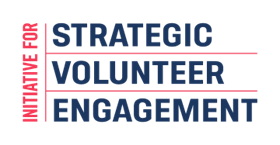Today was a longtime coming. After years of meetings, dialogue, presentations, advocacy, (and yes, maybe even some proverbial hair-pulling in frustration), today was the launch of the Initiative for Strategic Volunteer Engagement and the release of landmark research about how organizational leaders and funders view and prioritize volunteer engagement. This research was the result of a unique national collaboration of funders, researchers, volunteer-leadership organizations, and volunteer engagement advocacy organizations, one of which I helped to found and still serve.
You can watch the webinar recording to hear the findings yourself and you can download the research as well. But, to whet your appetite, here is some background from the Initiative for Strategic Volunteer Engagement.
As nonprofit organizations continue to face an increase in demand, limited resources and reduced staffing capacity in the wake of a global pandemic, new research finds that volunteer engagement has become more–not less–important to advance their work, but volunteers are now harder to find and engage. The Initiative for Strategic Volunteer Engagement, together with The Do Good Institute, today released new insights from more than 1,000 nonprofit CEOs and 100+ funders about the state of U.S. volunteer engagement.
The first-of-its-kind quantitative study on strategic volunteerism, “The State of Volunteer Engagement: Insights from Nonprofit Leaders and Funders” was conducted by Dr. Nathan Dietz and Dr. Robert T. Grimm, Jr. from the Do Good Institute at the University of Maryland’s School of Public Policy. This research study is being released in tandem with a new study on funding volunteerism, “Investing in Strategic Volunteer Engagement: A Qualitative Study”, which was led by Dr. Sue Carter Kahl of Sue Carter Kahl Consulting.
The release of these new reports is timed with the official launch of the Initiative for Strategic Volunteer Engagement (www.strategicvolunteerengagement.org), a new effort of funders and nonprofits who believe in the power of volunteers to expand impact and maximize mission accomplishment. Together, the group will provide practical and research-informed tools and resources to help nonprofits intentionally engage with their volunteer networks and inspire funders to further invest in strategic volunteer engagement.
As COVID-19’s lasting impact on civic life unfolds, the Do Good Institute-led survey found more demand for nonprofit services. In 2022, nearly two-thirds (64.4 percent) of nonprofits reported an increase in demand for their organizational services, with 51.1 percent increasing their delivery of services, and 48.5 percent increasing staff workloads to help meet demand. At the same time, 28.7 percent of nonprofits are operating with less funding and paid staff than they had before the pandemic.
“This gap in funding and staffing makes volunteers even more important for many mission-driven organizations. Nonprofits will likely face staff burnout or service delivery issues if this continues. Many of these organizations offer critical services and support to some of the most vulnerable people in our society, so this is something we should all be concerned about,” said Nathan Dietz, senior researcher, Do Good Institute.
Nonprofits are challenged by finding and recruiting the right volunteer support as well as by the capacity and infrastructure needed to sustain volunteer engagement. Nearly half (46.8 percent) of CEOs say that recruiting sufficient volunteers is a big problem for their organization, with many sharing that their volunteers were doing less of any specific organizational activity today (ie. delivery of services, fundraising or advocacy).
Despite these challenges, nonprofits seem to be more convinced of the benefits of volunteer engagement compared to recent years. The percentage of nonprofit CEOs who believe “to a great extent” volunteers allow the organization to provide more detailed attention to the people served increased from 37 percent in 2019 to 65.6 percent in 2022.
However, there is a gap between funders and nonprofits on the value and challenges surrounding strategic volunteerism. For example, 72.2 percent of nonprofit leaders felt that volunteers improve the quality of services or programs provided to a great extent, but only 25.2 percent of funders agreed. This lack of shared understanding can be problematic since funder investment is key to helping nonprofits recruit and engage more volunteers.
“Unfortunately, volunteers are more scarce in our post-COVID world. While nonprofits are putting more effort behind engaging volunteers, they are experiencing the triple whammy of greater demand for services, fewer volunteers and few funders with a track record of supporting volunteering. These troubling trends must be reversed,” added Dr. Robert Grimm, director, Do Good Institute.
“We believe in the power of volunteerism to advance mission-critical issues and causes, and that’s the main driving force for commissioning this research,” said Jeffrey Glebocki and Betsy McFarland, co-directors of the Initiative for Strategic Volunteer Engagement. “This research will be used to spark a national conversation for greater philanthropic investment in strategic volunteer engagement – and to equip more nonprofits to embrace strategic volunteer engagement for greater impact.”
The research announcement comes ahead of the release of the Initiative’s Strategic Volunteer Engagement Playbook—a framework for funders and nonprofits to leverage the power of volunteering to advance organizational goals and impact.
